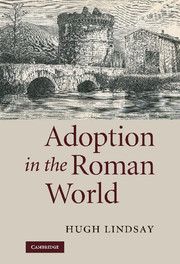Book contents
- Frontmatter
- Contents
- List of figures
- Preface
- List of abbreviations
- Introduction
- 1 Adoption, kinship and the family: cross-cultural perspectives
- 2 Kinship in Greece and Rome
- 3 Greek adoptions: comparisons and possible influences on the Roman world
- 4 Procedural aspects of Roman adoption
- 5 The testamentary adoption
- 6 Roman nomenclature after adoption
- 7 Adoption and inheritance
- 8 Roman freedmen and their families: the use of adoption
- 9 Adoption in Plautus and Terence
- 10 Sallust and the adoption of Jugurtha
- 11 Adrogatio and adoptio from Republic to Empire
- 12 Testamentary adoptions – a review of some known cases
- 13 Political adoptions in the Republic
- 14 Clodius and his adoption
- 15 The adoption of Octavian
- 16 Political adoption in the early Empire at Rome, Pompeii and Ostia; the imperial family
- Conclusion
- Glossary
- References
- Index
13 - Political adoptions in the Republic
Published online by Cambridge University Press: 25 January 2010
- Frontmatter
- Contents
- List of figures
- Preface
- List of abbreviations
- Introduction
- 1 Adoption, kinship and the family: cross-cultural perspectives
- 2 Kinship in Greece and Rome
- 3 Greek adoptions: comparisons and possible influences on the Roman world
- 4 Procedural aspects of Roman adoption
- 5 The testamentary adoption
- 6 Roman nomenclature after adoption
- 7 Adoption and inheritance
- 8 Roman freedmen and their families: the use of adoption
- 9 Adoption in Plautus and Terence
- 10 Sallust and the adoption of Jugurtha
- 11 Adrogatio and adoptio from Republic to Empire
- 12 Testamentary adoptions – a review of some known cases
- 13 Political adoptions in the Republic
- 14 Clodius and his adoption
- 15 The adoption of Octavian
- 16 Political adoption in the early Empire at Rome, Pompeii and Ostia; the imperial family
- Conclusion
- Glossary
- References
- Index
Summary
Already in Republican Rome adoption came to be used not merely to shore up deficits in family make-up, but also as a means of alliance for elite families – one of a number of strategies which emerged to cement and provide continuity for those families. Only in a relatively small number of cases has anything like enough evidence survived for us to piece together the motives and consequences of such adoptions (Corbier [1991b]). Some scholars have thought that these so-called political adoptions were generically different from those conducted in less significant families, where the custom did no more than provide a childless male with an heir.
Debate also arose amongst jurists during the nineteenth century about apparent differences between imperial adoptions and the theoretical familial situations envisaged in legal sources. The question of whether imperial adoptions were in fact fictitious adoptions arose. Did imperial adoptions simply use existing procedures to achieve unconventional ends? If so the aim might be to provide a kind of proclamation of the succession to the throne. The main result of an imperial adoption was to make the heir apparent a true member of the family. In the third century ad this method of designating a successor was abandoned and letters patent would designate the successor to the throne and give him the title of Caesar. Until that time, it can be seen that the hereditary principle was at least notionally observed.
- Type
- Chapter
- Information
- Adoption in the Roman World , pp. 169 - 173Publisher: Cambridge University PressPrint publication year: 2009



